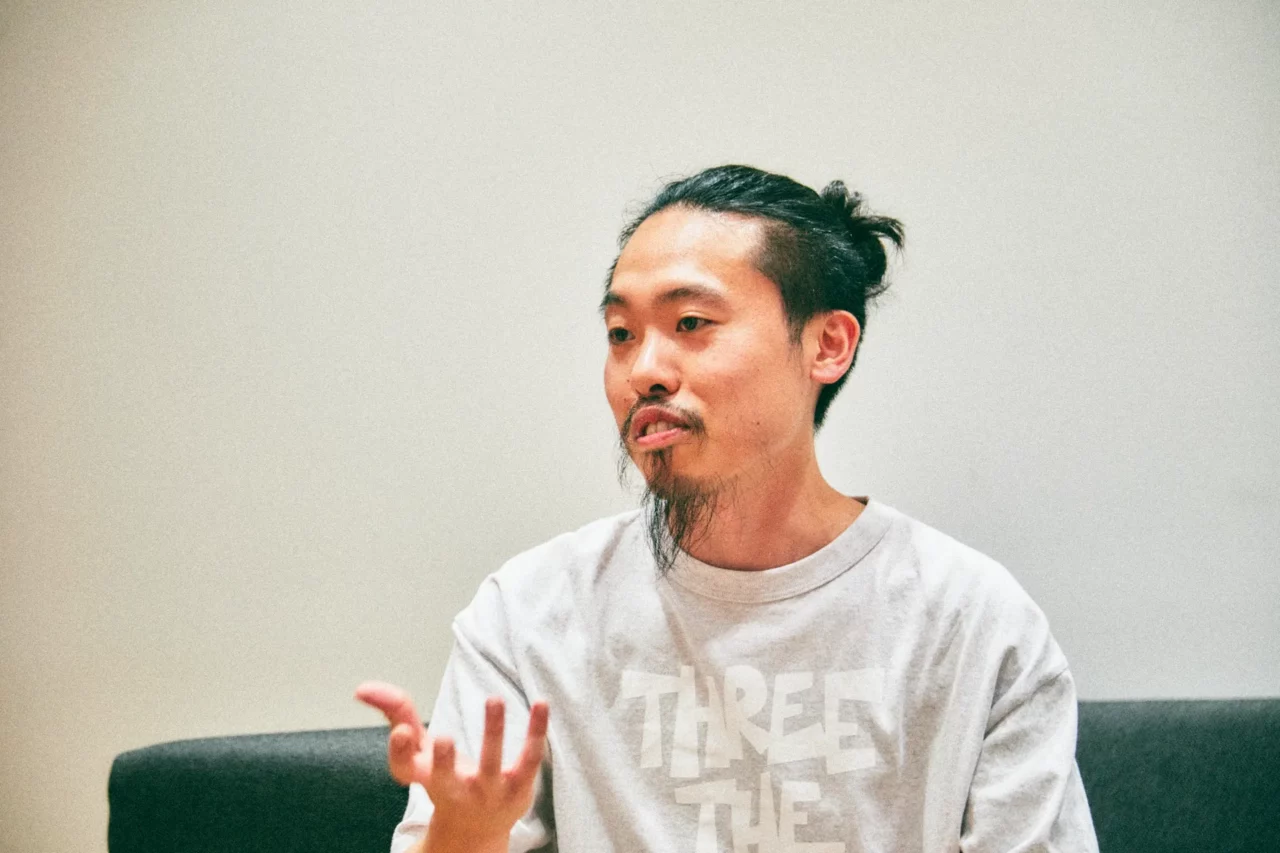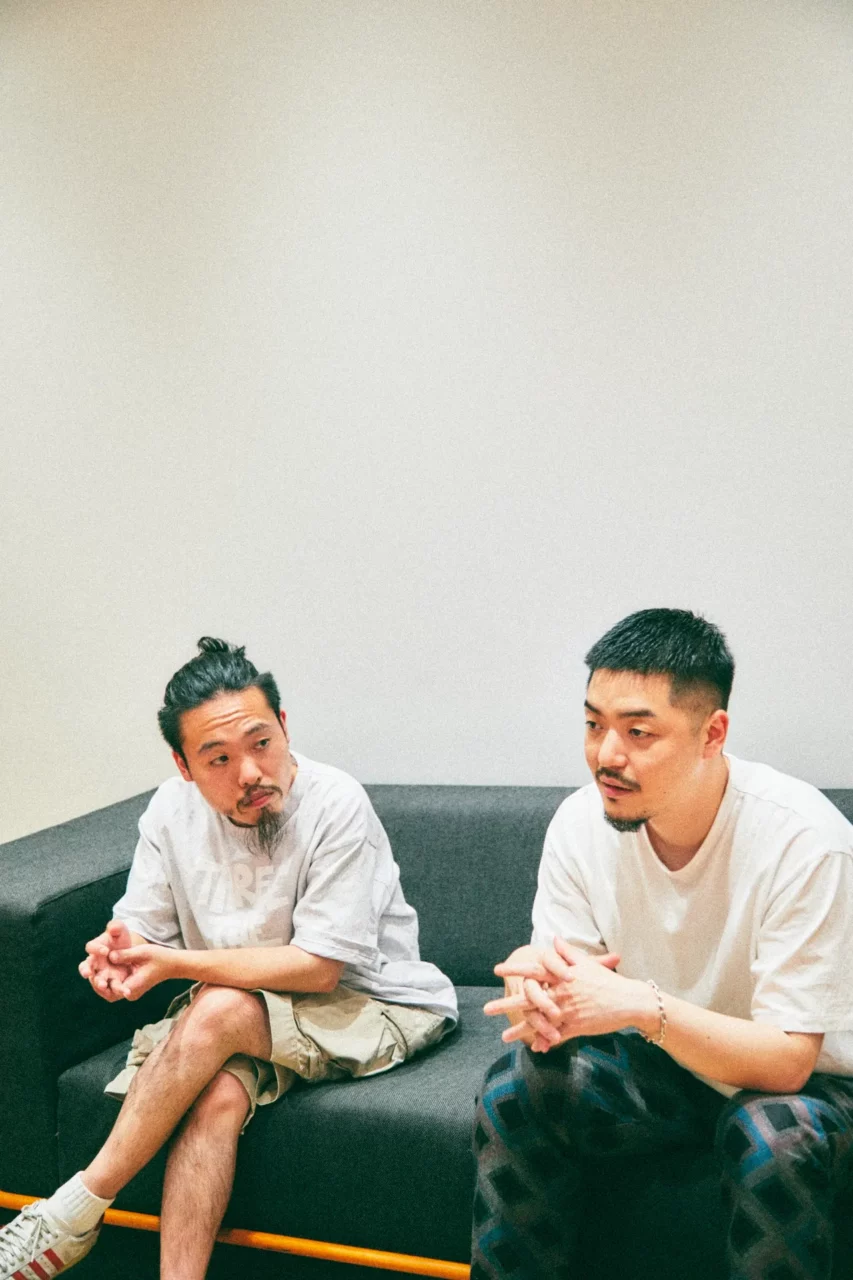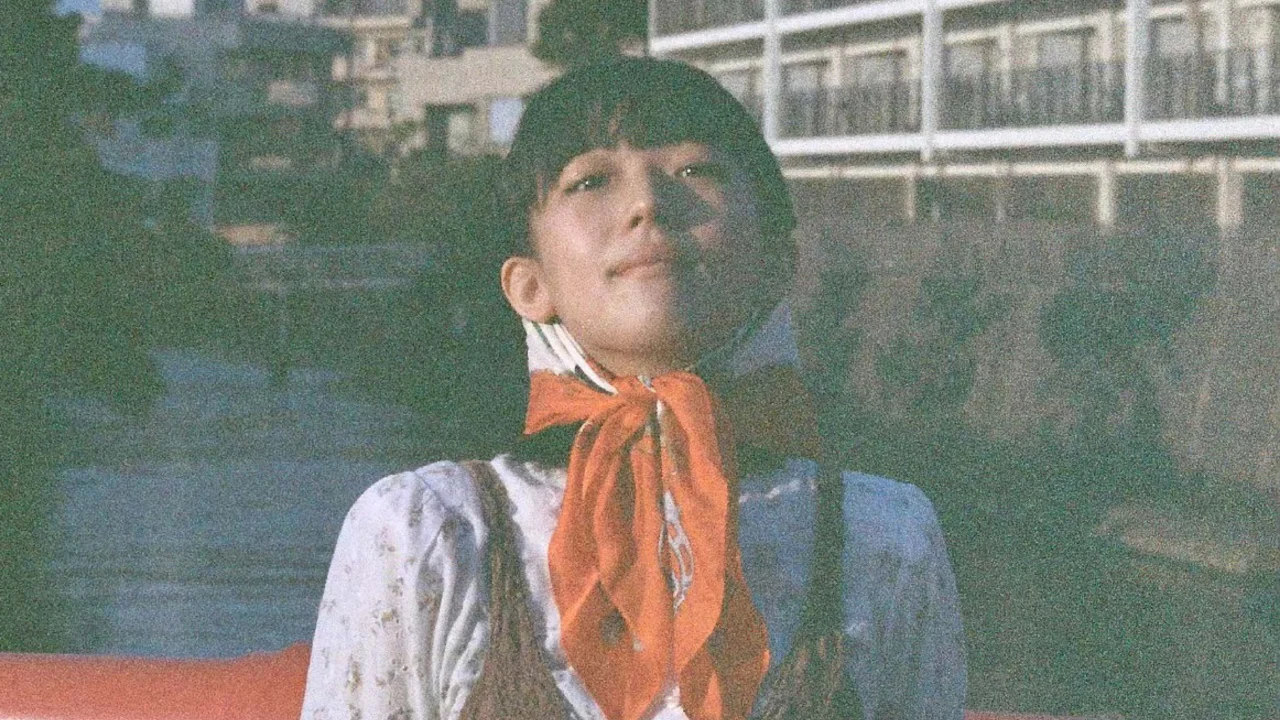At just nine years old, two boys crossed paths at a jazz school. Over the years, as they forged their own individual careers, they became pivotal figures in Japan’s modern jazz scene. Lifelong friends and friendly rivals, drummer Shun Ishiwaka and saxophonist Tomoaki Baba, reunited last year to collaborate as performers in the anime film ‘BLUE GIANT.’ Recently, both have released new works back-to-back.
Ishiwaka’s band, Answer to Remember, launched ‘Answer to Remember II,’ while Baba’s solo album, ‘ELECTRIC RIDER,’ marked bold new directions for both artists, further signaling the constant evolution of Japan’s jazz landscape. Responding to their casual wish to ‘chat over drinks,’ we made it a reality. In a relaxed setting, beers in hand, we delved into their childhood encounter, their musical philosophies, their latest projects, and the deep friendship that has shaped their shared jazz journey.
INDEX
“Shun Is the Reason I’m Still a Musician: Music Is the Only Thing That Ever Frustrated Me” (Baba)
Do you two often hang out like this, just drinking and chatting?
Baba: Not really. After gigs, we’re usually with other friends. The last time we had drinks just the two of us was around May of last year. Shun randomly messaged me, saying, ‘Hey, I’m nearby, are you free?’ So we ended up grabbing drinks for a couple of hours, right?
Ishiwaka: Yeah, I was feeling a bit lonely that day [laughs].
Baba: We all go through that sometimes [laughs].

Ishiwaka: I recall us having quite a passionate discussion. We were contemplating our next steps. We’ve matured as adults, but do we actually have a vision for what lies ahead?
That sounds like a serious topic.
Baba: When it’s just the two of us, those are the kinds of conversations we tend to have. It might be because we’re both busy, and those moments are really the only times we can dive into serious discussions.
Ishiwaka: We’ve been into jazz since childhood, which gives us a strong bond. But after high school, Tomoaki went to the U.S., while I remained active in Japan. We started collaborating again after he returned, but since we’re in different scenes, there’s always this sense of checking in on each other when we meet.
You both met at a jazz school in Hokkaido when you were nine. Did you have any awareness of each other back then?
Ishiwaka: Absolutely. The jazz school was quite large—about 40 students in the elementary division alone. Tomoaki was a soloist, taking the lead in the band and playing saxophone at the front. There were only a few who could play standout solos, and he was definitely one of them.

Percussionist. Born in Hokkaido in 1992. After attending the percussion program at the Music High School affiliated with Tokyo University of the Arts, he graduated from the university itself. He received the Akasaka Music Prize and the Douseikai Prize upon graduation. In addition to leading his own projects like Answer to Remember, SMTK, and Songbook Trio, he has participated in numerous live performances and works with various artists, including Quruli, Ringo Sheena, KID FRESINO, Oozora Kimijima, and CRCK/LCKS.
Baba: Was I playing well?
Ishiwaka: Absolutely, you were great. As a drummer, I didn’t stand at the front, but I always thought the essence of jazz lies in how a drummer responds to the improvisations of others and creates movement in the space. It was really enjoyable to play with Tomoaki in that context.
Baba: Isn’t it crazy that we were feeling those things back in elementary school? [laughs] I had no idea what the role of a drummer was at that time. Shun’s playing was incredible, but his knowledge was also impressive. He was like a music encyclopedia. He would say, “Have you heard this? It’s amazing!” and introduce me to all kinds of CDs. It was Shun who first introduced me to the debut work of Robert Glasper, and thanks to him, my knowledge of music really expanded.

Born in Sapporo, Hokkaido, in 1992. He entered Berklee College of Music in 2011 and, after graduating, based his activities in New York. After returning to Japan in 2020, he focused on his leader projects, releasing three leader albums, including ELECTRIC RIDER (2024). He performed the saxophone for the main character, Dai Miyamoto, in the animated film ‘BLUE GIANT,’ which was released in 2023.
Ishiwaka: When I was listening to real-time jazz, I didn’t have many friends around who could talk about music. So, I was looking for people with whom I could share knowledge and play together. One of those people was Tomoaki.
Baba: When we had sessions at the jazz school, Shun was always the one bringing in ideas, saying, “How about this arrangement?” He was making a lot of musical suggestions even back then, and I think that led to projects like Answer to Remember.
You’ve influenced each other since childhood.
Baba: The reason I’m still pursuing music is because of Shun. I didn’t come from a musical family, and I never really wanted to be a musician. I was also into swimming and had an interest in medicine. I didn’t dislike studying, and I had various things I wanted to do. But with music, I felt a sense of frustration. I wanted more opportunities and wanted to improve. I never felt that way while swimming. But when I met Shun at the jazz school, for the first time I thought, “I don’t want to lose to him!” If I hadn’t met Shun, I might have become a doctor by now. After a surgery, I might have been listening to Shun’s new work and thought, “He’s doing something really complex lately” [laughs].

INDEX
Shun Ishiwaka’s Decision Against Moving to the US: Contemplating “Our Identity”
You were both close friends and rivals.
Baba: When I entered high school, Shun had already moved to Tokyo and started performing with famous players like Akira Sakata. I watched that with a sense of envy. He was still a dear friend, but I couldn’t help feeling a bit envious as well. However, after I moved to the U.S. for college, those feelings faded, and I was able to see things more objectively.
Ishiwaka: I see. I thought it was amazing that Tomoaki was performing in America. He was collaborating with players I admired and participating in the same festivals and events. There was a time when I really wanted to pursue opportunities in the U.S. too.
Why didn’t you go to the U.S.?
Baba: I always thought you should come over.
Ishiwaka:I had many opportunities to perform and engage with contemporary music at university (Tokyo University of the Arts). There were a lot of players aiming for orchestral careers or competing in competitions, but for me, the feelings and excitement I experienced while engaging with contemporary music were comfortable and enjoyable. It felt like a music that reflected my background directly and was very immediate. Learning about the rich history of contemporary music over the past 60 years, hearing about the real transmission from my seniors and teachers was also thrilling. I felt inspired when performing works by composers like Toru Takemitsu and other Asian composers, and every time I participated in the world premiere of a new piece, I thought, “As a performer, this is what I should be doing.”

When performing classical and jazz music from abroad, how do you incorporate your identity and uniqueness as a Japanese person? That’s a significant question.
Ishiwaka: I was thinking along those lines, so at that time, I felt somewhat distant from America. I was interested in the jazz scene happening in real-time in New York and still loved it, though.
Baba: This is the first time I’m learning why Shun stayed in Japan. While I was active in the U.S., I was also pondering, “What does it mean to be Japanese?” Jazz, being a music that originated from Africa and America, offered many opportunities to study history and culture through performing with people of various backgrounds. As I went to America and had conversations with them, I realized that I didn’t know much about Japanese culture. Musicians like Akira Sakata and Tiger Okoshi, who have spent a long time in the U.S., are well-versed in American culture as well as Japanese culture, and they integrate both into their own expression. I think there’s been an increase in jazz musicians doing similar things recently. Musicians like Avishai Cohen and Tigran Hamasyan are fusing region-specific music with jazz and other formats. I’ve thought a lot about how to respect both Black and White cultures while also honoring Japanese culture in jazz.

So the two of you were thinking about the same thing in different places. Baba-san made his debut as a member of J-Squad, a band of Japanese musicians living in New York. Ishiwaka-san, in addition to his solo activities, is active in various bands such as CRCK/LCKS and Mononkuru.
Baba: When I was in America, I followed the Japanese scene through Shun’s Facebook, learning about interesting new people emerging in Japan. I got to know new talents like Fumitake Ezaki (WONK), Taishi Nukada (Tokyo Shiokoji), and Daiki Tsuneta (King Gnu) through Shun, and I found it fascinating to watch a new music scene develop in Japan.
Ishiwaka: At that time, I wondered why there were so many interesting musicians in Japan, yet their music wasn’t spreading globally. I thought we needed to create a strong scene in Tokyo for that to happen, and I discussed this almost every day with my seniors and peers. Everyone was very passionate and driven back then.



























